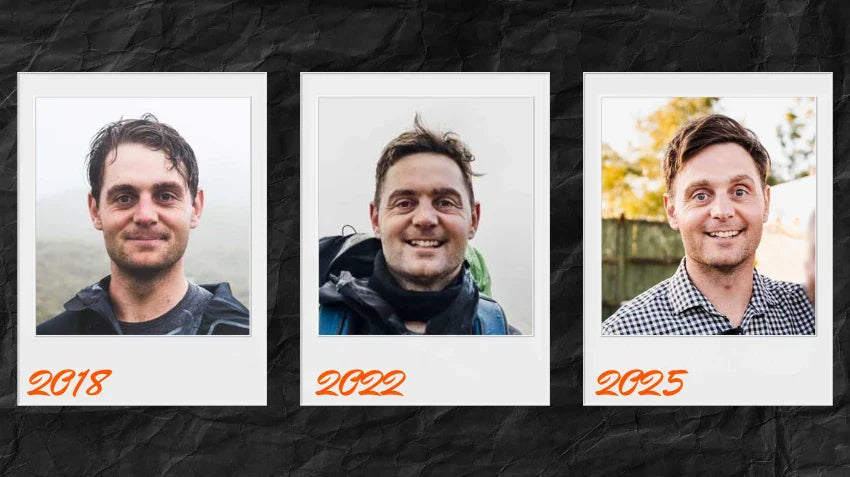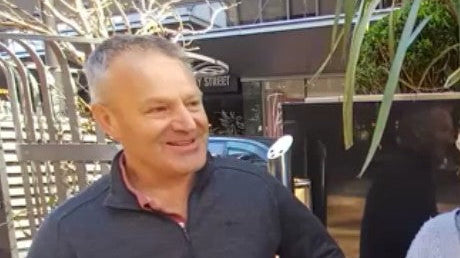Have you been told that your illness is incurable and that you’ll “just have to live with it?” For 11 years, I lived with an “incurable” chronic illness, too. I saw multiple specialists, tried every treatment I could find, spent $100,000, but nothing worked. And then, I recovered!

The key to chronic illness recovery is understanding why you became so ill in the first place, and then addressing the underlying cause. There are five main causes that keep people stuck in long-term illness. The good news is that each one has a way out. Let’s explore them!
1. The physiological stress response
The number one underlying cause of chronic illness is when your body is stuck in a physiological stress response. This isn’t just “feeling stressed”, it’s a full-body survival mode. Your body pumps blood and energy to your heart, lungs, and limbs so you can run fast from a tiger. That’s lifesaving.
The problem is that modern tiger situations go on for decades instead of seconds. Mortgages, early childhood trauma, work stress, and even the stress of living with an illness all cause your body to stay in an elevated stress response for too long. It takes huge amounts of energy to keep your body fired up, ready to fight or flee, and all that energy must come from somewhere. It gets “stolen” from your immune system, digestion, hormones, reproductive system, detox pathways, and even your brain. Over months or years, this stress “lock” can trigger migraines, gut issues, autoimmune disorders, fertility struggles, chronic fatigue, and more. It also causes POTS and restless leg syndrome, those organs are being constantly over-fueled, so they race too fast.
Infertility recovery
I once had a client who had 11 miscarriages in a row. The more miscarriages she had, the more stressed she became. When she learned how to calm her nervous system, she conceived again and went full term. Your body must be calm to have the resources available to grow a baby.
Celiac recovery
I’ve worked with several clients with Celiac Disease. That’s “incurable,” right? They learned how to calm their systems, allowing natural repair. When they did follow-up endoscopies, their amazed doctors gave them the all-clear.
Your body is a powerful self-healing mechanism
Your job is to create the right conditions, to calm your system enough so that natural healing becomes possible.
2. Bad neural habits
Do you scan your body constantly, predicting what will hurt or make you tired? Habits aren’t just what you do, they’re how your brain wires itself. When illness becomes chronic, the brain can get stuck in “loops,” sending illness messages long after the original trigger is gone.
Chronic pain recovery
Take chronic pain, for example. Around 75% of amputees experience pain in a limb they no longer have. That’s because the pain isn’t coming from the limb, it’s coming from the brain’s pain centre. I’ve seen clients avoid spinal surgery simply by rewiring their thoughts about pain, altering predictions of what will hurt, and breaking old neurological loops.
Multiple sclerosis recovery
I had a client with multiple sclerosis (MS). She said, “My whole body burns all of the time”. We recalibrated this statement to “a third of my body is sore a quarter of the time”, which she was surprised to realise was more accurate. And do you know what happened next? Her pain levels shot down to about 20% of what they had been at the start of this conversation! By a week after the course finished, she had thrown away her electric leg stimulator and could walk her children to school.
Does this mean that MS is not real? No! Her illness was real. The myelin sheath around her nerves had diminished, but calming the physiological stress response and shifting the bad habits allowed her body to go into a calm state that allowed healing of her neural pathways.
3. Unresolved trauma
A trapped emotion is an unprocessed feeling that the body continues to hold long after the original event is over. If the healing response is interrupted or suppressed, the leftover tension is stored as body memory. Over time, these stored emotions can contribute to chronic conditions.
Fibromyalgia recovery
A client’s fibromyalgia had gotten worse each time her ex-husband had physically attacked her. As we worked together to release the trauma, her pain dropped by around 30% with each memory released until she said, “All my pain is gone!”. It never came back.
Endometriosis recovery
A client suffered from endometriosis so severely that she was bedridden for five days each month. Working with her inner child to release sexual abuse trauma made a profound difference. To her astonishment, her very next cycle was pain-free. She later became pregnant, something her doctor said was impossible.
4. Lifestyle factors
Health isn’t just about what’s happening inside your body and mind, it’s also shaped by your environment and daily habits. The science of well-being research has identified 12 key factors that strongly influence well-being, diet, exercise, good-quality sleep, sunlight, downtime, fun, a positive work environment, having purpose, deep social connection, helping others, participation in spiritual or community life, and intimacy.
Repetitive strain injury recovery
One client had been on three months of sick leave due to RSI in his wrist. During 'The Switch', he realised that he had spent the entire three months playing computer games, using a mouse for hours every day, with no pain at all. The real problem? He hated his job. Once he changed careers, his pain disappeared completely.
Multiple chemical sensitivities recovery
A client suffered from multiple chemical sensitivities so severe that he thought he’d have to leave his city life entirely. During 'The Switch', he discovered that his reactions weren’t caused by chemicals or Wi-Fi, he was reacting to ongoing tension in his marriage. Once he worked through his relationship challenges, all his symptoms disappeared, and he was comfortable living in the city again.
5. Beliefs
If you believe your condition is incurable, you are less likely to seek solutions or to be open-minded to solutions that you read about. You are also more likely to be depressed and feel helpless, which affects your hormone balance and can further deplete your well-being. Many of my clients report improvements to their symptoms just from applying for 'The Switch' before they actually attend it. This surprises them, but it doesn’t surprise me. Getting hope for recovery is a powerful way to start shifting hormone balance, lower stress levels, change neural pathway wiring, and generally start creating better well-being.
ME/CFS recovery
For decades, ME/CFS has been trapped in a narrative of hopelessness, that it’s an incurable, lifelong condition with no effective treatment. But this perspective is not only outdated, it’s being actively challenged by both patients who are recovering and a new wave of integrative research.
Related article: Research into effective treatments for ME/CFS
I have seen hundreds of ME/CFS clients recover. It is very possible! Like with MS, recovery does not mean that the condition was not real and physical in the first place. It’s about putting the body into a physiological state where it can heal a physical condition.
Anxiety recovery
A nine-year-old boy was diagnosed by a psychiatrist with anxiety and told that he was incurable. What a terrible message to give to anyone, let alone a 9-year-old! The biggest part of my job was to break down the belief that the doctor had given him. “But it’s incurable. The doctor told me”, he kept saying. Finally, I managed to help him shed that belief, and it was amazing how fast he then recovered from anxiety. He bounced into the psychiatrist's office to show him what he had achieved. The surprised doctor initially congratulated him, but then made a terrible remark, “Your changes may not last.” His mother said she watched her son’s shoulders slump, his head lower, and he became very quiet. By the time they got back to the car, he was anxious again. We had to work through this new belief together, and then he was calm. Thankfully, his mother chose not to make any more follow-up visits to that psychiatrist!
What you believe creates your reality
Challenge limiting beliefs and replace them with empowering ones. When the mind believes recovery is possible, the body often follows.
Solutions for chronic illness recovery
-
Calm your stress response: Teach your nervous system that the tiger is gone. Breathing exercises, yin yoga, slow walking, mindfulness, meditation, and brain retraining programmes are all helpful.
-
Change your thinking habits: There are many brain retraining programmes to help you stop recycling illness messages. My programme is called 'The Switch'. There are books such as Unlearn Your Pain, though guided, structured programmes can offer more personalised strategies.
-
Release unresolved trauma: There are many 1-1 methods to release trapped emotions safely, EMDR and The Journey are both well-regarded. 'The Switch' is one of the only brain retraining programmes that has techniques specifically for releasing past trauma, which you can then use yourself afterwards for ongoing emotional release.
-
Address your lifestyle: Take an honest inventory of your lifestyle and environment. Aligning your daily life with well-being principles can shift your body and nervous system back into balance, supporting long-term recovery.
-
Challenge faulty beliefs: Don’t let yourself do any more doom scrolling. Follow recovery stories and logical information about recovery, rather than focusing on negative information. Shift your beliefs so that you are ready for recovery.
-
Attend a free webinar: Visit here to sign up for a free 40-minute webinar “First Steps to Recovery” so that you can learn more about how stress affects well-being and how to catch those illness thinking patterns.
-
Sign up for a webinar package: At Empower Therapies, I offer a range of webinar packages to suit your health needs and your budget. These range from two hours to a comprehensive 6-week programme.
-
Attend 'The Switch' programme: 'The Switch' is the deluxe approach to chronic illness recovery since it is fully live training with me. It is four days in a small group setting, attended in-person or online. It covers all the components of chronic illness recovery and has extensive follow-up. Around 80% of participants report great results, despite 75% of them having been told by doctors that they are incurable.
Recovery is possible
It may have felt like there would never be a way out of chronic illness, but for most of the people I see, chronic illness recovery is a reality! Start finding your hope again. There is usually a way out!

I can help you overcome chronic illness. I was ill for 11 years and had a full recovery! My clients have 80-90% success rates. You could be next!
The answer for me was not a magic pill, but in understanding why my body had become so sick, and learning techniques to start undoing the underlying patterns of chronic illness.
Watch First Steps to Recovery – a FREE 40 minute webinar – to start your wellness journey immediately!
First Steps to Recovery includes:
- My own and others’ recovery stories to get your hope for recovery back
- Introducing the five main illness traps so you understand why this happened to you
- The role of the stress response in chronic illness to deepen your understanding
- Q&A answering important questions about recovery
- An action plan for moving forwards into your own recovery – it’s time to get started!
- A FREE info pack about the five illness traps
- Special discount on the “Next Steps to Recovery” webinar package







